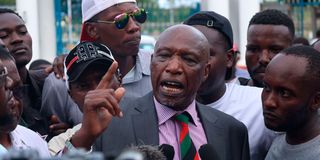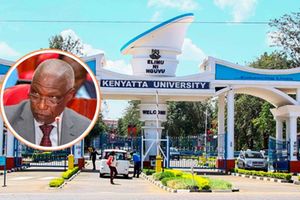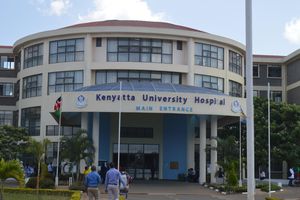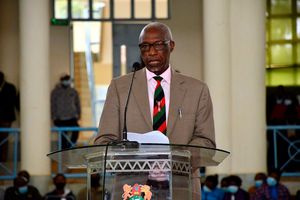
Kenyatta University Vice Chancellor Prof Paul Wainaina addresses students at the institution on April 30, 2025 after the High Court reinstated him to the position.
A year ago, Professor Paul Wainaina was unceremoniously sent on compulsory leave by the Kenyatta University Council – a move that threatened to end his distinguished academic career spanning over five decades.
But rather than retreat into silence and self-pity, the soft-spoken educationist took the bold step of seeking justice through the courts.
Determined to clear his name and restore his dignity, Prof Wainaina emerged victorious last week. The court reinstated him as vice chancellor, allowing him to resume office at one of Kenya’s largest public universities, which has an enrolment of over 50,000 students.
Now back at the helm, Prof Wainaina is on a mission to reclaim the Kenyatta University Teaching, Referral and Research Hospital (KUTRRH) for the institution. The state-of-the-art facility, built at a cost of about Sh11 billion with funding from the Chinese government, was intended to serve as a practical training ground for students pursuing medical and other health science programmes at KU.
He now traces his troubles to ownership of the hospital.
"This is my eighth year as VC, and my term ends in January 2026," said Prof Wainaina.
Upon completing his term, he plans to return as a professor at KU until his retirement on June 30, 2026 when he turns 75.
"I wanted to conclude my academic and managerial career on a high note. But the accusations levelled against me during the previous administration resurfaced under the new government," he remarked during an exclusive interview with Daily Nation in Mombasa.
Prof Wainaina had been sent packing in 2022 just before the general elections but was reinstated by the Kenya Kwanza administration. However, he believes his unwillingness to compromise on matters of integrity led to his removal, again.
"I was targeted for refusing to act against the interests of Kenyatta University. I won’t go into the specifics, but that is the root cause," he said.
Asked whether politics played a role, he responded, "I don’t know for sure, but it seems there was some support behind it."
He said the council used his accumulated leave days as the reason to get him out of the way.
"In academia, we have annual leave and sabbatical leave for those in management. I was told to proceed on leave and ended up taking 202 days, which ended on January 30, 2025," he explained.
When he wrote to the council expressing his intention to resume duty, he was instructed to continue with the leave.
"In December 2024, I received a letter telling me to exhaust all my remaining leave days as I was nearing retirement. That’s when I started suspecting foul play. I requested to serve my remaining term as VC and professor, but it was clear they didn’t want me back. I found it unfair," said the don.
He said his reputation was unfairly tarnished, prompting him to seek legal redress.
"I had no disciplinary case or wrongdoing. That’s why I went to court to demand the right to finish my term. On Wednesday morning, the court ruled in my favour, and by afternoon, I was back at KU," he said.
During his sabbatical leave, Prof Wainaina worked on his memoir, which he plans to publish in July 2025. Last weekend, he joined leaders of the Kenyatta University Students Association (KUSA) to reflect on recent events and celebrate his return.
"What hurts me most is seeing a facility (KUTRRH) we laboured so much to build being used by others, while our students – the rightful beneficiaries – are excluded. We want the hospital returned to KU," he said.
He explained that in 2012, KU embarked on construction of the hospital using funding from the Chinese government, channelled through the Kenyan government. The facility was completed in 2018.
However, the VC said his woes began in 2019, when the Ministry of Health converted the hospital into a State corporation.
"When the new government took office in 2022, I hoped the hospital would be returned to us but that did not happen. I took the matter to the National Assembly and Senate," he said.
Both the Auditor-General and parliamentary committees questioned the hospital’s ownership.
Prof Wainana said both the Senate and National Assembly Education committees have directed that the hospital belongs to KU.
“We have finished the hospital, we have to manage it. Both the senate committee and the National Assembly gave out their report on the hospital, which were adapted but the hospital has not be returned back,” said Prof Wainaina.
The VC said KU students studying medicine, pharmacy and other related programmes have not been able to access the facility.
Prof Wainaina further urged the State to allow the university to use a wing which was supposed to be a medical school. The facility was supposed to be used by medicine, nursing, pharmacy, public health, medical laboratory among others.
“We have been struggling to maintain quality by using sub-standard facilities like Kiambu or Thika hospitals. It is a serious issue. If I can secure the hospital before I retire, I will feel satisfied,” said the don.
He said students have raised concerns about the contested higher education funding model.
“They have told me some of the issues that need to be prioritised. But some of the problems are beyond KU as an individual university, they are issues affecting all the institutions of higher learning in fact, the whole education system,” said Prof Wainaina.
He credited Prof Waceke Wanjohi who has been acting VC and KU management team for keeping the institution afloat despite financial difficulties.
“We are trying to map out some of the few achievements that we have made and also embark on the way forward. The main problem affecting universities is funding,” said the don.
As a member of the Presidential Working Party on Education Reforms, Prof Wainaina expressed concern over the implementation of the funding model.
“A new formula for funding university education was recommended but we are finding that there are certain things that do not seem to be working. We came up with five categories. There were those we thought were capable of paying, others struggling even in secondary schools and we needed to identify them,” said Prof Wainaina.
Classification of students is determined through a means testing instrument (MTI), which assesses a their financial need to arrive at the amount of support a student receives.
The support is through scholarships awarded by the Universities Fund (UF) and student loans disbursed by the Higher Education Loans Board (HELB).
While the scholarship component is non-repayable, the tuition and upkeep loans must be repaid after graduation, accruing an annual interest rate of four per cent.
“The problem arose during implementation. We discovered that the method for categorisation did not function effectively. Simply put, we lacked the necessary data to accurately categorise students,” explained the don.
“So when the categorisation was done, most students who were unable to pay were categorised in the clusters for those who were able to pay. Sixty per cent of the students were in four and five clusters, which created significant difficulties,” he added.
“It’s unrealistic. Many [students] will drop out. The government must develop a foolproof system that accurately identifies students who genuinely cannot afford to pay,” the don stated.
He further argued that the assumption that learners who attended private schools can automatically afford university fees is flawed.
“Parents make sacrifices. If this aspect is improved and the government fulfils its financial obligations, the programme can succeed. The previous model was functional until the government, which was expected to fund 80 per cent per programme, slashed its contribution to 40 per cent,” Prof Wainaina observed.
The don began his career at Kamwenje Teachers Training College, where he trained as a primary school teacher before joining the University of Nairobi for secondary teacher training. He later advanced his academic career, eventually becoming a university professor.
“I have worked in many educational institutions. I began lecturing at university level in 1984 after earning my PhD,” he said.
He served at Moi University for 10 years, becoming the first chair of the Department of Education. When Namibia gained independence, he took a sabbatical leave to teach there for eight years.
He returned to Kenyatta University in 2005 as a professor in the Department of Educational Foundations. He quickly rose through the ranks, first being appointed Deputy Vice-Chancellor in charge of administration, and later, after six years, being named VC.








